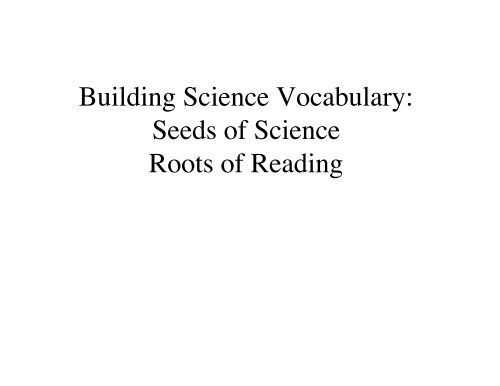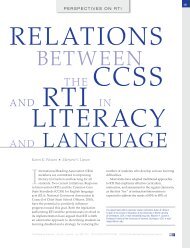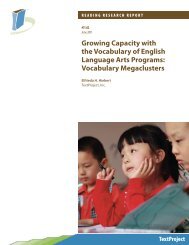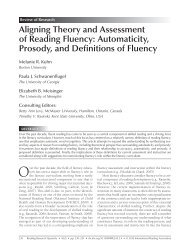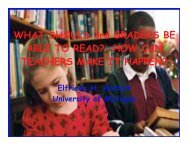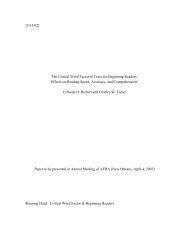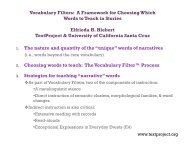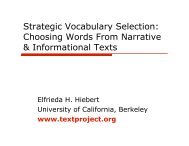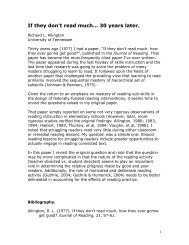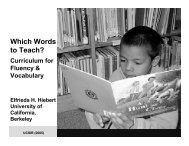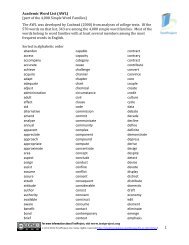Building Science Vocabulary: Seeds of Science Roots ... - TextProject
Building Science Vocabulary: Seeds of Science Roots ... - TextProject
Building Science Vocabulary: Seeds of Science Roots ... - TextProject
You also want an ePaper? Increase the reach of your titles
YUMPU automatically turns print PDFs into web optimized ePapers that Google loves.
<strong>Building</strong> <strong>Science</strong> <strong>Vocabulary</strong>:<strong>Seeds</strong> <strong>of</strong> <strong>Science</strong><strong>Roots</strong> <strong>of</strong> Reading
Goal• Review our model for vocabularydevelopment• Share some vocabulary instructionalroutines• Approach to ELL vocabulary development
<strong>Vocabulary</strong> Research• Low <strong>Vocabulary</strong>=Low reading performance (Johnson &Pearson, 1984)• Large word gap between Low and High SES groups (Hart& Risley, 1995; Biemiller, 2004)• Explicit and on-going vocabulary instruction makes adifference (Beck & McKeown, 2002)• Few programs in place to improve second languagereading vocabulary
Many science educators are apprehensiveabout vocabulary instruction.Apprehensions about vocabulary:• Long tradition <strong>of</strong> science as memorization <strong>of</strong> newwords—high school biology texts have 45-50% more newwords than are presented in a semester <strong>of</strong> foreign language.(Armstrong and Collier; 1990)• Words are taught as an end unto themselves rather than aslabels for new conceptual understandings• <strong>Science</strong> vocabulary can serve as an obstacle to conceptualunderstanding
<strong>Seeds</strong>/<strong>Roots</strong> Approach to <strong>Vocabulary</strong>Development1. Carefully select a limited set <strong>of</strong> highlygenerative and powerful discipline specificwords2. Use them repeatedly in: books, student sheets,teacher questions, discussion prompts3. Reduce number <strong>of</strong> singletons in books4. Allow students to see relationships betweenthese words5. Assist students in building active control <strong>of</strong>these words
NoControlPassiveControlActiveControlHabitatKnowing how the word sounds or looks whenit is written.
NoControlPassiveControlActiveControlHabitat: The place or environment where aplant or animal naturally or normally lives andgrows.Knowing its definition
NoControlPassiveControlActiveControlA habitat has everything an animal needsto survive.The grassland habitat is windy with fewtrees.Knowing its context <strong>of</strong> use
NoControlPassiveControlActiveControlShelterWaterFoodAnimalsHabitatShorelineDesertForest FoodKnowing its relationship to other words
Unit Specific WordsTerrarium InvestigationsFocused Core <strong>Vocabulary</strong>• Decomposition• Isopod• Habitat• Adaptation• Evidence• Terrarium• Organism• shelterWords with Less Power• Decay• SproutWords with Less Relevance• Light• Stem• seed
Generative vocabulary• We have been able to identify, across a range <strong>of</strong>K-5 science texts, a set <strong>of</strong> “high utility” sciencewords• Words that while not highly frequent in generaldiscourse, recur with great regularity in sciencetexts• We teach these words and look for opportunitiesto use these words again and again in all <strong>of</strong> theselanguage and experiential modes.
Grade Level Set <strong>of</strong> Words• Observe• <strong>Science</strong>/Scientist• Compare• Evidence• Explain/Explanation• Investigate• Record• Prediction• Question• Model
I. Everyday/<strong>Science</strong> Word chart• Use everyday language as a conceptualbridge• Teaching should involve meeting studentswhere they are and building upon their priorknowledge
Activity Structures that Promotethe Language <strong>of</strong> <strong>Science</strong>Everyday Languagefigure outgroupguess, thinklook atseeshowtelltell, showScientific Languageconcludecategorize, classifypredict, inferexploreobserve, analyze,discover,demonstratereport, explainexplain
write downrecordtry out, testhomeclues, pro<strong>of</strong>experimenthabitatevidence
II. Talk about Words DuringReading• Call attention to the use <strong>of</strong> the word in thecontext <strong>of</strong> the text.• Provide a concise definition <strong>of</strong> the word.• Generate further discussion that elaboratesdefinitions, provides additional context,and/or connects word to existing experienceor understandings.
III. Help students build connectionsamong words/concepts to develop richconceptual understandings• Opportunities to map out relationshipamong science concepts• “asking students to explain scientificphenomenon, either orally or in writing,should enhance their content understanding”(Rivard & Straw, 2000).
PlantsOrganismsAnimalsEtc.OrganismsPlantsAnimals
AdaptationsWhat is it? What’s it like? Examples
• Habitat• Shelter• Organism• Sand• Rocks• Weathering• Mixture• Solution• Dissolve• Invention• Test• EvidenceWhat is the relationship?
English Language Learners &<strong>Vocabulary</strong>• Native Spanish speaking ELLs• Cognates--words that have a similar spelling,pronunciations and meaning across at leasttwo languages (e.g., cliente/client,televisión/television).• False cognates-words that have a similar spellingand pronunciation but different meaning across atleast two languages. (embarrassed/embarazada)
Everyday Spanish/AcademicEnglishCommonWordEnglish CognatesEnglishAcademicWordSpanishCommonWordSpeed Velocity VelocidadWeather Climate ClimaMoon Lunar LunaDirt Terra-rium TierraDamp Humidity HumedadWater Aqua AguaThird Tertiary TercerSun Solar Sol
Cognate Research• Garcia, G. E. & Nagy, W. E. (1993). Latino Students’ Concept<strong>of</strong> Cognates. In Leu, D. J., Kinzer, C. K., (Eds.), Examining Central Issuesin Literacy Research, Theory, and Practice. Forty-Second Yearbook <strong>of</strong> theNational Reading Conference.• Nagy, W. E., Garcia, G. E., Durgunoglu, A. Y., & Hancin-Bhatt, B. (1993). Spanish-English bilingual students’ use <strong>of</strong> cognatesin English reading. Journal <strong>of</strong> Reading Behavior, 25(3), 241-259.• Jiménez, R. T., García, G. E. & Pearson, P. D. (1996). Thereading strategies <strong>of</strong> bilingual Latina/o students who are successful Englishreaders: Opportunities and obstacles. Reading Research Quarterly, 31(1),90-112.
<strong>Seeds</strong>/<strong>Roots</strong> Cognate Frequencies100%90%79%80%Percent <strong>of</strong> Total Words70%60%50%40%30%18%20%3%10%0%Cognate NonCognate False CognateCognate Type
<strong>Seeds</strong>/<strong>Roots</strong> Cognate-typeFrequencies100%90%80%Percent <strong>of</strong> Total Words70%60%50%40%30%20%10%14%43%4%39%0%High FrequencyEnglish/HighFrequency SpanishLow FrequenyEnglish/LowFrequency SpanishCognate TypeHigh FrequencyEnglish/LowFrequency Spanish*Low FrequencyEnglish/HighFrequency Spanish
Cognate Strategy when Reading1. Explain that cognates are words that are spelled almost the same,sometimes pronounced similarly and have a similar meaning inEnglish and in Spanish2. Provide an example: Look at the word acid and look carefully at thespelling.3. Think <strong>of</strong> a word in Spanish that sounds like or looks like the wordacid.4. When students respond with ácido, have them think about what theword means in Spanish.5. They could also give some examples <strong>of</strong> things that are acid.6. Have them guess at the meaning <strong>of</strong> the word acid. They could givesome examples.7. Have students go on a cognate hunt and find other words that arecognates in the book.
<strong>Seeds</strong>/<strong>Roots</strong> Approach to<strong>Vocabulary</strong>/ConceptualDevelopment• Commit to a small set <strong>of</strong> core science words thattogether (and in combination with firsthandexperiences and talk)• Repeated opportunities for exposure and practice• Immersion in the language <strong>of</strong> science through multiplelanguage modalities• Instead <strong>of</strong> avoiding scientific terminology and registerin classrooms, we need to embrace it to help studentsbuild a rich conceptual network


